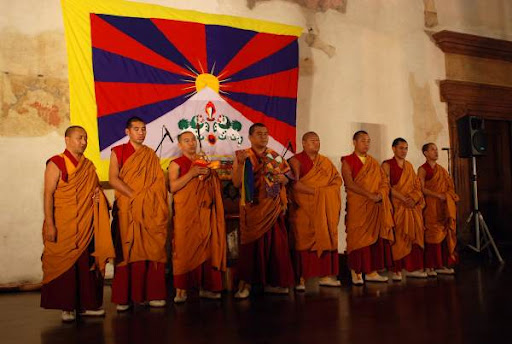Difference between revisions of "Tibet, 1959 - 1966"
| (One intermediate revision by the same user not shown) | |||
| Line 2: | Line 2: | ||
[[File:Tibet.npg.jpg|400x200px|framed|left]] | [[File:Tibet.npg.jpg|400x200px|framed|left]] | ||
| − | Mao Zedong's so called "Great Leap Forward" (1959 - 1962) led to famine in Tibet. The Panchen Lama at the timewas convinced that these deaths were as a result of official policies, rather than natural disasters as was suggested. The famine was followed by the desecration of more than 6,000 of Tibetan monasteries and the killing of thousands of Tibetans. In 1960 a non-governmental International Commission of Jurists conducted a report on behalf of the United Nations which accused China of [[genocide]]. According to the ICJ, the Chinese acted with the specific intent of eradicating Tibetan culture. Even today, Tibetans are all too frequently not allowed to participate in the cultural and general life of their specific community. | + | [[Zedong, Mao|Mao Zedong]]'s so called "Great Leap Forward" (1959 - 1962) led to famine in Tibet. The Panchen Lama at the timewas convinced that these deaths were as a result of official policies, rather than natural disasters as was suggested. The famine was followed by the desecration of more than 6,000 of Tibetan monasteries and the killing of thousands of Tibetans. In 1960 a non-governmental International Commission of Jurists conducted a report on behalf of the United Nations which accused China of [[genocide]]. According to the ICJ, the Chinese acted with the specific intent of eradicating Tibetan [[Culture|culture]]. Even today, Tibetans are all too frequently not allowed to participate in the cultural and general life of their specific community. |
[[Category:Acts of Genocide since World War II]] | [[Category:Acts of Genocide since World War II]] | ||
Latest revision as of 14:50, 1 April 2014
1959-1966
Mao Zedong's so called "Great Leap Forward" (1959 - 1962) led to famine in Tibet. The Panchen Lama at the timewas convinced that these deaths were as a result of official policies, rather than natural disasters as was suggested. The famine was followed by the desecration of more than 6,000 of Tibetan monasteries and the killing of thousands of Tibetans. In 1960 a non-governmental International Commission of Jurists conducted a report on behalf of the United Nations which accused China of genocide. According to the ICJ, the Chinese acted with the specific intent of eradicating Tibetan culture. Even today, Tibetans are all too frequently not allowed to participate in the cultural and general life of their specific community.
